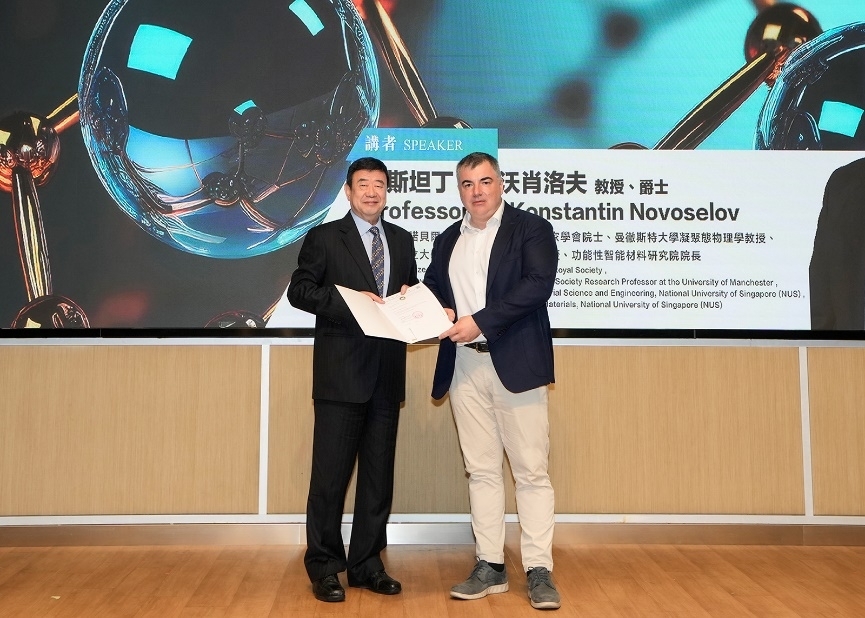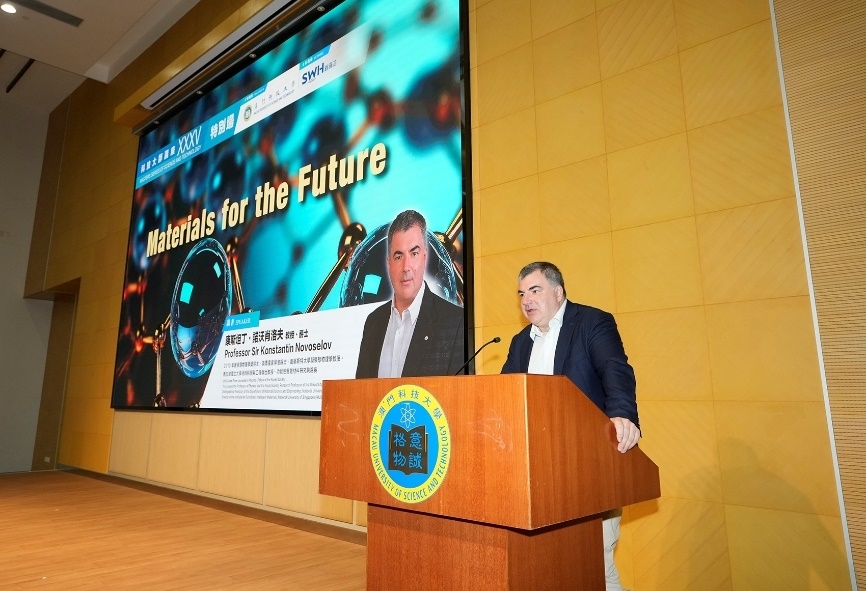The Great Masters of Science and Technology Lecture Series, hosted by the Macau University of Science and Technology (M.U.S.T.), was successfully held at 3:30 p.m., February 2nd, 2024, in N101 Hall at Block N Library Building of M.U.S.T. In this lecture, we have had the honor to invite a well-known condensed matter physicist and Nobel Prize laureate in Physics, Professor Sir Konstantin Novoselov, as the speaker of our special lecture "Materials for the Future". Vice President of M.U.S.T., Chair Professor Paul Kwong Hang Tam delivered a warm welcome speech, and a souvenir and a certificate of appointment were given to Professor Sir Konstantin Novoselov from Chancellor of M.U.S.T., Dr. Liu Chak Wan as a token of appreciation for giving us the special lecture to our staff and students of M.U.S.T.

Professor Sir Konstantin Novoselov receiving the certificate of appointment
From Chancellor of M.U.S.T., Dr. Liu Chak Wan
During the lecture, Professor Konstantin Novoselov first introduced one of the most significant discoveries of his scientific career which earned him his Nobel Prize: the material graphene and the important applications of
this material. Graphene has unique properties such as strong excellent electrical and thermal conductivity, toughness, and stretchability, so it can be applied in many different fields, such as scientific microelectronics like including high-frequency speed photodetectors and multi-functional transducers sensors, etc.
Next, Professor Konstantin Novoselov spoke about the current issue mass production of graphene is facing. Although graphene can be prepared by mechanical exfoliation of graphite, the process is inefficient and uncontrollable in a way. The professor said that in the past, the method of extracting graphene from graphite was although effective, it was also very inefficient. Now, one of the most common ways to produce graphene is directly from carbon. The beauty of this method is that it graphene can be produced with almost anything that contains carbon. Professor Novoselov gave a humorous example: Graphene can even be produced synthesized by pricking a finger and rubbing the wound on some a copper foil. Since there is carbon in the blood, its carbon atoms bond to each other via a method called chemical vapor deposition, forming graphene on the copper surface. This example helped us quickly understand how graphene can be produced.

Professor Sir Konstantin Novoselov during the lecture
Lastly, Professor Sir Konstantin Novoselov talked about the importance of the application of artificial intelligence in the materials analysis of material data. There are complicated calculations of physical laws such as non-equilibrium thermodynamics and the equation of state. If done using traditional manual methods, it would take humans an extended period of time, possibly hundreds of years. Such time-consuming work can now be done in a much shorter timespan with artificial intelligence. This will play a crucial role in helping to solve the sustainability issues in materials scientific research and development worldwide.
During the Q&A session, the students asked how to use these materials more widely, and Professor Sir Konstantin Novoselov’s reply was to effectively leverage artificial intelligence as a tool to guide the production of materials with specific characteristics is something we are currently trying to do. Professor Sir Konstantin Novoselov is hopeful that the widespread and efficient application of these materials will be possible in the future, and that it will be based on the foundation of scientific experience and intuition.
